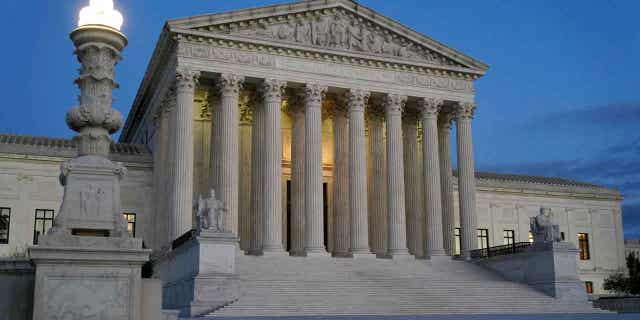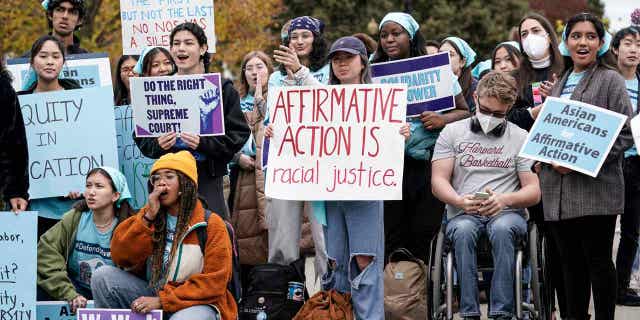The New York Times was widely criticized by conservatives on social media Thursday over a tweet that said the Supreme Court’s decision rejecting affirmative action would make colleges “whiter and more Asian.”
“Breaking News: The Supreme Court rejected affirmative action at Harvard and UNC,” the newspaper tweeted Thursday following the Supreme Court’s 6-3 decision striking down affirmative action.
“The major ruling curtails race-conscious college admissions in the U.S., all but ensuring that elite institutions become whiter and more Asian and less Black and Latino.”
The tweet immediately drew criticism from conservatives, who called the tweet racist due to the implication that minority students won’t be able to compete with White students.
SUPREME COURT AFFIRMATIVE ACTION CASE: HOW CALIFORNIA SEES ITS IMPACT
The New York Times building on 8th Avenue in New York City. (Don Emmert/AFP via Getty Images)
“The New York Times appears to be inferring that black and brown people are too stupid to get into a colleges on their own merit,” Timcast’s Josie Glabach tweeted.
“Show us on the doll where equal protection under the law touched you, NYT,” Federalist CEO Sean Davis tweeted.
ASIAN-AMERICAN STUDENT WITH 1590 SAT SCORE REJECTED BY 6 ELITE COLLEGES, BLAMES AFFIRMATIVE ACTION

Light illuminates part of the Supreme Court building at dusk on Capitol Hill (AP Photo/Patrick Semansky, File)
The New York Times did not immediately respond to a request for comment from Fox News Digital.
The nation’s highest court handed down the historic ruling on affirmative action Thursday and rejected the use of race as a factor in college admissions as a violation of the 14th Amendment’s equal protection clause.
CLICK HERE TO GET THE FOX NEWS APP
Chief Justice John Roberts said for too long universities have “concluded, wrongly, that the touchstone of an individual’s identity is not challenges bested, skills built, or lessons learned but the color of their skin. Our constitutional history does not tolerate that choice.”
Justice Clarence Thomas, the nation’s second Black justice, who had long called for an end to affirmative action, wrote separately that the decision “sees the universities’ admissions policies for what they are: rudderless, race-based preferences designed to ensure a particular racial mix in their entering classes.”

Activists demonstrate as the Supreme Court hears oral arguments on cases involving affirmative action. (AP Photo/J. Scott Applewhite, File)
Justice Sonia Sotomayor wrote in dissent that the decision “rolls back decades of precedent and momentous progress.”
In a separate dissent, Justice Ketanji Brown Jackson, the court’s first Black female justice, called the decision “truly a tragedy for us all.”
Associated Press contributed to this report